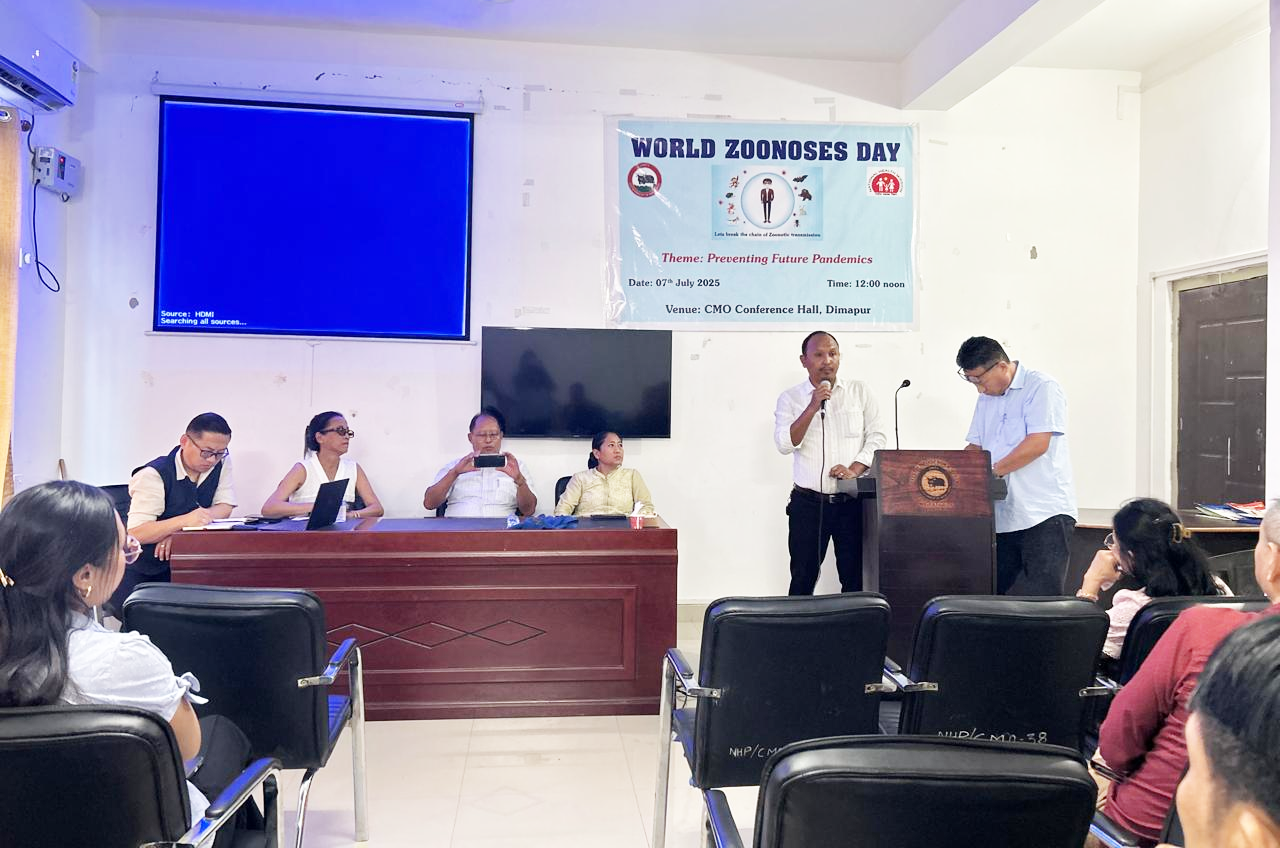World Zoonoses Day was observed in Chief Medical Officer’s (CMO) Conference Hall Dimapur on July 7, 2025, for medical officers under CMO Dimapur under the theme, “Preventing future pandemics.”
Dr. Kavito Zhimomi, District Programme Officer (DPO), CD-I Dimapur, conducted the programme, which commenced with a welcome address by Dr Yartenla Jamir, CMO Dimapur. Dr. Jamir highlighted the significance of zoonotic diseases and the need for heightened awareness and effective management of zoonotic diseases since the covid pandemic.
Dr. Nyan, State Programme Officer (SPO) Kohima, presented on the scenario of Rabies in Nagaland, with a special focus on Dimapur. He underscored the importance of adopting the “One Health” concept, which emphasizes the interconnectedness between humans, animals, and the environment. He pointed out that human activities are leading to the emergence of new diseases and stressed the need to focus on zoonotic diseases prevalent in the state, such as rabies.
Rabies, being a notifiable disease, requires immediate reporting of any cases to the district and state health authorities.
Dr. Nyan shared data from the state’s rabies programme, initiated in 2022, which shows that most dog bite cases are reported in children below 10 years, with 80% of the cases coming from pet dogs. Alarmingly, many dog owners do not vaccinate their pets, increasing the risk of rabies transmission.
In Dimapur, between January and March 2025, 211 dog bite cases were reported, with 209 cases resulting from stray dog bites. The data also revealed that many people do not undergo post-exposure preventive measures, which are crucial after a potential infectious animal bite or scratch.
Download Nagaland Tribune app on Google Play

Dr Nyanthung Kikon, SPO IDSP also highlighted the efforts of the National Rabies Control Programme (NRCP), which aims to achieve zero deaths by rabies by 2030. Under the NRCP, rabies vaccines are made available in all government health facilities, along with snake bite anti-venom.
Vikeshe, DLDO Dimapur, presented on the history of pandemics, citing examples of zoonotic spillovers that led to major outbreaks such as the Bubonic plague, Spanish flu and COVID-19. He listed some infectious diseases with the potential to cause future pandemics and discussed factors contributing to the re-emergence of zoonotic diseases, including increased demand for animal protein, unsustainable use of natural resources, exploitation of wildlife, and climate change.
Dr Molu Ozukum, Nodal Officer-NRCP, District Hospital Dimapur, talked about preventing future pandemics, covering the causes, consequences, and measures to reduce pandemic spread. He also highlighted the clinical management of rabies, scrub typhus, and Japanese Encephalitis (JE).
During the discussion hour, the members agreed to develop a common Action Plan on Surveillance at the earliest for easy data sharing between the allied departments and to facilitate early warning signs in case of a potential outbreak.
The programme was attended by Dr E Kopfoh, Chief Veterinary Officer Dimapur and Dr Amenla Imchen, Chief Veterinary Officer Chumukedima , medical officers and staffs under CMO office and the veterinary department.

